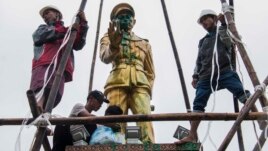02 October, 2018
A movement in Myanmar to build statues of independence hero General Aung San risks renewed tensions with the country's ethnic minorities. It could also affect the ruling party's chances in planned elections, observers say.
Aung San is the father of National League for Democracy leader Aung San Suu Kyi. He is popular in large parts of Myanmar, also called Burma.
Aung San's critics are more likely to be found in border areas, where many ethnic minorities live. Some there say the statues are a part of what they call continued "Burmanization." They instead would like to see statues representing heroes that belong to their own ethnic group.

FILE - workers clean a vandalized statue of Myanmar independence hero Gen. Aung San, in Myitkyina, capital of Kachin state, Myanmar, July 23, 2018.
In Kayah State, there have been large protests against a planned Aung San statue.
"If we're going to have statues, it should be of heroes in our state," said Mie Mie, a civil society leader. He added that the central government should ask local people what statues they want.
Ethnic minorities have long been distrustful of a central government dominated by the country's Bamar-majority. When Burma gained independence from the British in 1948, representatives of ethnic minority groups signed a deal that would provide them with "full autonomy." The agreement was never honored.
The distrust grew stronger over many years of military rule. Armed ethnic groups operating in the border areas fought with troops, and strong hatred continues to exist.
Many minorities hoped the situation would change when the National League for Democracy (NLD) won elections in 2015, but distrust has continued to grow.
Aung San Suu Kyi promised to work for peace, but has not had much success. Members of ethnic minority groups now consider her as being closely allied with the military.
Statue building
There appears to have been an increase in the number of Aung San statues being built since the NLD came to power. In June 2017, the country's largest Aung San statue was unveiled in Mandalay. Several others have been set up in ethnic minority areas.
It is not clear who is paying for the statues. A spokesperson for the NLD could not be reached for comment.
In July, thousands of people protested a planned statue in Kayah State. Weeks later, another Aung San statue in Myitkyina, the capital of Kachin State, was attacked.
The editor of The Chinland Post in Chin State, Salai Holy, told VOA the state government is planning to build at least two Aung San statues there.
He added that most locals oppose the statues because they believe the money for them is wasted. They believe the money should be used to help develop one of the country's poorest areas.
"That money should be used for the town's development," he said. Salai Holy added that water systems, hospitals and roads are in bad condition and need rebuilding.
Another statue is planned in Hakha, the state capital, and he said a decision to do so had not included discussion with the local communities. He said some people wanted to see an Aung San statue in the town, but most were against it.
"It doesn't mean that we don't respect Aung San, but what we really want that money to be used for is development...There is so much to be done," he said.
Political ramifications
Observers say offending ethnic minorities could affect the results of by-elections in November and the 2020 general elections. The NLD could lose votes, they warned.
In 2017, the central government wanted to name a bridge for Aung San in Chaungzon, a town in Mon State. Local people wanted the bridge to be given a name more closely related to Mon identity and held protests. In a by-election held later that year, the NLD lost to the party of the military.
I'm Susan Shand.
Oliver Slow reported this story for VOANews. Susan Shand adapted it for Learning English. George Grow was the editor.
________________________________________________________________
Words in This Story
autonomy – n. the state of existing or acting separately from others
editor – n. someone who makes changes to a story or pictures in an effort to improve the product
unveil – v. to make public; to show for the first time